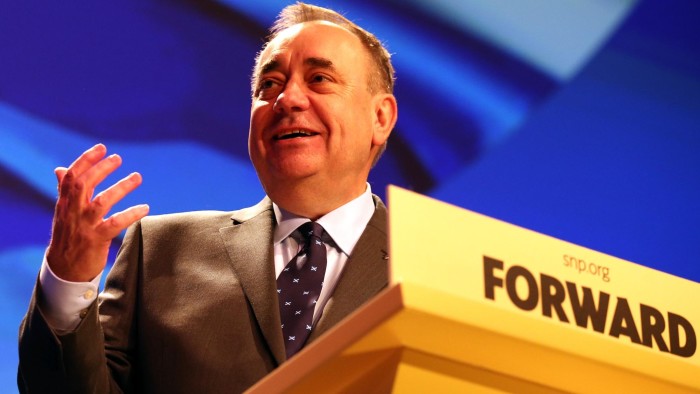Independent Scotland based on ‘aspiration rather than reality’

Roula Khalaf, Editor of the FT, selects her favourite stories in this weekly newsletter.
Alex Salmond’s promise of a prosperous future for Scots in an independent Scotland is based on “aspiration rather than reality”, MPs said today in a report that rebukes the Scottish first minister for failing to offer businesses clarity on his country’s future currency or continued EU membership.
The wide-ranging report on the future of Scotland by the select committee for business innovation and skills concludes that remaining part of the UK is in the “best economic interests” of Scotland.
“There is genuine and deep concern about the threat to future prosperity of Scotland raised by the prospect of a Yes vote,” Adrian Bailey, chair of the committee, said.
“Arguments based on aspiration rather than reality do little to advance the cause of Scotland. The Scottish government has failed to make the argument that Scotland would be better off economically as a separate state.”
The committee called on the Scottish government to “come clean and lay out the detail” on the future currency of Scotland, given that all three main political parties have said the country cannot keep the pound should it become independent.
“It’s no longer tenable for the Scottish government to assert an independent Scotland will retain the pound when a sterling currency union is firmly off the table. The Scottish government must play fair with Scottish businesses, investors and voters, and set out its plans for an alternative currency.”
The MPs’ concerns were echoed this week by the National Institute of Economic and Social Research, which warned on an independent Scotland’s financial stability. The leading think-tank said Scotland would have little scope to offer emergency lending facilities to its banks should it choose to leave the UK without entering a formal currency union.
The reports cap the end of a difficult week for the first minister, who on Tuesday was thrown on to the defensive over the currency in the first live TV debate ahead of next month’s referendum.
The select committee report also honed in on key campaign pledges of the Scottish government to renationalise the Royal Mail and to charge English students fees to study at Scottish universities.
In depth

Scotland will decide in a referendum to be held on September 18 2014 whether or not to end the 307-year-old union with England
MPs warned today that Mr Salmond’s pledge to renationalise the Royal Mail was “uncosted” and could end up putting a “significant” cost burden on to Scottish consumers and taxpayers to maintain a universal postal service.
“The renationalisation of the Royal Mail may well be an attractive campaigning tool. However, the Scottish Government has to set out in detail the costs of renationalisation and how they would be met,” said the committee.
“The risk to Scotland is that provision of the universal postal service will come at significant additional cost, either to the taxpayer or to the consumer.”
Under the existing system, revenue is generated from where post is sent, not where it is received, which means Scotland benefits from being part of a UK-wide postal system. Scotland also disproportionately benefits from the Royal Mail’s commitment to universal postal service at a set stamp price. More one in four of the population live in rural areas where it is more expensive to transport mail.
The committee of MPs – five of whom represent Scottish constituencies and all of whom are members of the pro-union parties – also warned that the Scottish government’s plans to charge tuition fees to students from other parts of the UK were likely to be illegal under EU law.
On EU membership, the MPs raised “serious concerns” that a Yes vote could in the short term leave Scottish businesses uncertain of their position in Europe, and said protracted negotiations over EU membership would be damaging to companies operating in Scotland.
Comments